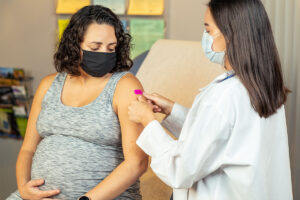‘Triple-demic’ of respiratory illnesses launches vaccination season. Have you gotten yours?
The letter below, written by GVN's president, Dr. Sten Vermund, was originally published in The Baltimore Sun.
We are amid the “triple-demic” of respiratory illnesses season that includes a significant increase in U.S. COVID-19 hospitalizations alongside annual seasonal surges in respiratory viruses like influenza (“the flu”) and respiratory syncytial virus (RSV). For the flu and COVID-19, the Global Virus Network (GVN), headquartered in Baltimore, joins the U.S. Centers for Disease Control and Prevention in recommending that everyone 6 months and older receive both a flu shot and the new COVID booster if you haven’t already. Additionally, those of us over 60 years also should get the RSV vaccine, and women who are 32-36 weeks pregnant should be vaccinated to protect their babies from severe RSV.
 Flu and COVID vaccines are especially important for people living with weakened immune systems and adults over 60 years of age. The flu vaccine is also critically important for children under 5. For healthy individuals, it is important that we receive the vaccines to mitigate the spread of infection, especially to our more “at-risk” populations. Last year, flu season peaked in December, which was two months earlier than usual so this year we urge you to get these vaccines now.
Flu and COVID vaccines are especially important for people living with weakened immune systems and adults over 60 years of age. The flu vaccine is also critically important for children under 5. For healthy individuals, it is important that we receive the vaccines to mitigate the spread of infection, especially to our more “at-risk” populations. Last year, flu season peaked in December, which was two months earlier than usual so this year we urge you to get these vaccines now.
RSV is a respiratory infection that infects nearly all children by the age of 2. In healthy people, symptoms are usually mild and resolved within a week. However, RSV can cause serious illness or death in vulnerable individuals such as premature and very young infants, children with lung or heart disease and us older folks over 60. Two new RSV vaccines for people over age 60 were approved by the U.S. Food and Drug Administration this spring, so it’s important that we over-60s get it as soon as possible.
Advice for children regarding RSV protection is a bit complex. Nirsevimab provides transient immune protection and is recommended for all infants younger than 8 months of age who are born during — or who are entering — their first RSV season unless their mothers were vaccinated with RSV vaccine at least 14 days before delivery. Children ages 8 months to 19 months can receive nirsevimab if they are vulnerable and entering their second RSV season.
Three COVID-19 vaccines were authorized this fall by the CDC to cover the new strains of the virus circulating now, as opposed to the variants that circulated last year or earlier. This new booster shot protects substantially from serious disease.
As we all know, COVID-19 can set us back days or weeks, impacting not just our health but the economy, particularly in regions with significant outbreaks. More severe cases of COVID-19 can result in “Long COVID” symptoms, including organ damage, disability and death. As GVN’s Dr. Rubeshan Perumal said during our annual meeting in Monaco last month, 15% of those infected with COVID-19 present with Long-COVID symptoms, leading to a substantial burden that is underrepresented in disenfranchised socio-economic groups. This creates a global problem that needs a global solution. At the GVN, we are navigating this changing landscape through science nurtured in our Long-COVID Task Force. In the meantime, our first line of defense, including social distancing and face masks, is to ensure there is vaccine access for all and educate the public on the importance of getting vaccinated.
In a joint statement by the GVN and the World Health Network, we stressed the critical need for universal access to new vaccines in 2023. We should provide access to all populations. The surge in variants observed in recent weeks highlights the urgency of vaccinating individuals before they are exposed to potential risks. For example, the return to school is a primary source of infection for children and families. Failure to boost with the new vaccines with the return to school has led to many infections that likely could have been avoided.
So, get your two or three respiratory vaccines and encourage your loved ones to do so as well. We can prevent much disease and death by doing so.
—Sten Vermund
Dr. Vermund is president of the Global Virus Network (GVN) and serves as the Anna M.R. Lauder Professor of Public Health, Dean Emeritus of the Yale School of Public Health, and professor in pediatrics at the Yale School of Medicine.
